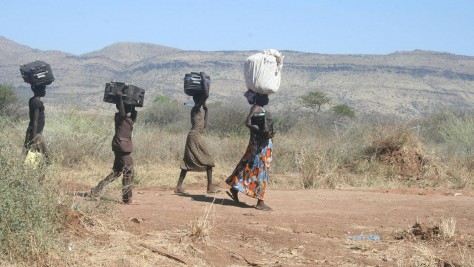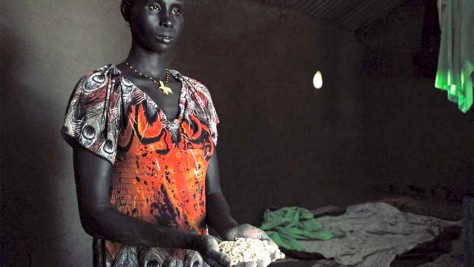Hungry for help: refugees in Kenya feel the effects of recent food cuts
KAKUMA REFUGEE CAMP, Kenya, January 9 (UNHCR) – Nyachot squints up at the midday sun above Kakuma Camp as she stirs the daily meal for her family. Before last November, the 34-year-old South Sudanese refugee could cook twice a day. But when the World Food Programme cut rations by 50 per cent that month, she feared for her children’s future.
“The food does not even last the two weeks that it should,” Nyachot told UNHCR visitors, turning to gaze at her baby son. Like thousands of other women at this camp in north-west Kenya, she relies completely on the rations she receives, in the absence of any other source of income. Full rations were later resumed on January 1, but the situation remains serious and fresh funding is needed to avert the risk of further cuts in the future.
Nyachot fled South Sudan in February last year, after fighting intensified between government forces and rebels. Desperate to save her children, she embarked upon an arduous weeklong journey that took her from her home in Maiwat, Upper Nile state to Nadapal, the border entry point to Kenya.
Her eyes filled with tears as she recalled the trauma. “I travelled by boat with about 40 other people for five long days to Juba and then took a bus from there to Nadapal,” she said. “My children were hungry and thirsty.”
When they finally arrived in Nadapal, UNHCR officials and other humanitarian agencies were there to greet them with energy biscuits and water. Later, at Kakuma’s reception centre, they received hot meals, sleeping bags and a place to sleep, before being transferred to Kakuma 4, the new settlement area for South Sudanese arrivals.
For Nyachot, finding refuge in Kakuma and receiving food assistance was a huge relief. Non-food items, such as blankets, cooking utensils, an energy stove and jerry cans, were also supplied and helped her family settle into their new home. But with the food ration cuts in November, Nyachot’s concern quickly began to grow.
In one of the nearby mud houses, Stephen and Gawar shared similar worries. They fled Pangak in South Sudan’s Jonglei state and, like Nyachot, sought refuge in Kakuma. “The situation is very bad,” observed Stephen, interviewed before full rations were resumed last week. “We eat once a day and the food can get finished after five days. Some of our people are even thinking of going back home. It is not an ideal solution, but people are desperate.”
Nyagai, their 36-year-old neighbour, concurred. “Once the rations run out, I survive by begging for food from my neighbours,” she says. “It is a shame to do so but what option do I have?”
Her friend, Nyapel, smiled sadly when she revealed that she could not breastfeed her 11-month-old son due to a medical condition. “I have to sell part of my meagre rations so as to buy milk for him. If I don’t this, then my son will not survive.”
After the ration cuts took effect in November, concerted efforts were made by World Food Programme to raise additional funding and restore full rations – and this was possible at the start of the month. But the funding situation remains uncertain and WFP and UNHCR have issued joint appeals to donors for help.
Meanwhile, UNHCR and partner NGOs continued to engage with refugees through their community leaders to assure them of continued support during November and December. These efforts were a result of the recent joint Inter-Agency Regional Appeal for the South Sudan Emergency Response.
Although refugees had been assured that this was a temporary situation, they remain concerned. “If the food cuts continue, many people will suffer, especially the elderly, the women and children,” said Gawar. Stephen believed that their hope lies with UNHCR.
As she turned back to her cooking, a glimmer of hope flickered in Nyachot’s eyes. She, at least, believed that things would get better; if not for her then at least for her children.
Page 1 of 6
-
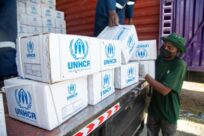
UNHCR lends support to flood-affected people in Nairobi
30 Apr 2024 -
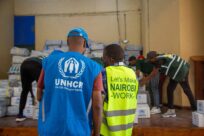
UNHCR steps up to support people displaced following gas explosion
8 Feb 2024Nairobi – On Saturday 3 February, UNHCR, the UN Refugee Agency, mobilized to contribute immediate assistance to people affected by the explosion and fire in Embakasi, Nairobi. The Embakasi fire broke out on Thursday 1 February, following a gas explosion at the Jua Kali area near City Stadium in Nairobi […]
-
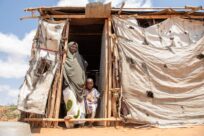
UNHCR commits to climate action in Africa to protect displaced populations and foster resilience
5 Sep 2023GENEVA – UNHCR, the UN Refugee Agency, reaffirms its dedication to climate action as a central element of its mission to address displacement and provide protection to vulnerable populations in Africa. UNHCR’s Assistant High Commissioner for Operations, Raouf Mazou, and Director General and Special Representative of the United Nations Climate […]
-
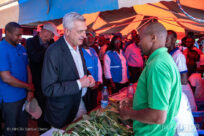
Joint Statement by the Government of Kenya and the UN High Commissioner for Refugees: High Level Dialogue on the Shirika Plan
20 Jun 2023The Government of Kenya and UNHCR, the UN Refugee Agency, co-hosted today a special high-level dialogue on the transitioning of refugee camps in the country into integrated settlements aimed at promoting the socioeconomic inclusion of refugees and bringing additional support to the local Kenyan communities alongside them. Building on the […]
-

UNHCR statement on protest at Kakuma refugee camp
24 Nov 2022UNHCR, the UN Refugee Agency, calls for dialogue and peaceful engagement following an unauthorized demonstration by a group of refugees with an LGBTIQ+ profile in front of its office in Kakuma refugee camp, Kenya, on 23 November. On Wednesday morning, a group of protestors marched towards UNHCR’s office in Kakuma. They were asked […]
-

Information for Persons of Concern on roadmap and solutions for refugees in Dadaab and Kakuma camps
24 May 2021The UN High Commissioner for Refugees visited Kenya at the end of April to have discussions with the Government on solutions for the refugees living in the camps. The Government of Kenya and UNHCR agreed that they will work together with you to implement a solutions strategy this year and […]
-

UNHCR deeply saddened by the tragic death of LGBTIQ+ refugee; calls for accountability
12 Apr 2021UNHCR, the UN Refugee Agency, is deeply saddened by the death of an LGBTIQ+ refugee who was the victim of an alleged arson attack on 15 March 2021 in Kakuma refugee camp. “We are deeply shocked by this tragic loss and wish to express our sincere condolences to the family […]
-

Kenya: UNHCR presents sustainable and rights-based solutions for refugees residing in camps
9 Apr 2021UNHCR, the UN Refugee Agency, has shared with the Government of Kenya a proposed set of sustainable and rights-based measures aimed at identifying solutions for refugees living in the Dadaab and Kakuma refugee camps in Kenya. UNHCR recognizes the tremendous generosity that the people and Government of Kenya have demonstrated […]
-

UNHCR Statement on the situation of LGBTIQ+ refugees in Kakuma camp
25 Mar 2021This statement is in response to a number of inquiries we have received on the overall situation of LGBTIQ+ refugees in Kakuma refugee camp and a security incident that took place on 15 March 2021. UNHCR, the UN Refugee Agency, remains deeply committed to the protection of Lesbian, Gay, Bisexual, […]
-

UNHCR Statement on the Government of Kenya’s intention to close Dadaab and Kakuma refugee camps
24 Mar 2021UNHCR, the UN Refugee Agency, is grateful to the people and Government of Kenya for generously hosting refugees and asylum-seekers for several decades and recognize the impact this generosity has had. UNHCR has been informed by the Kenyan authorities of their intention to close Dadaab and Kakuma refugee camps within […]

